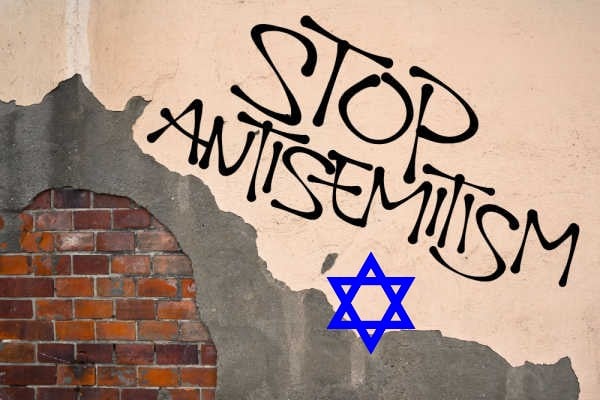The distinction some people draw between antisemitism and anti-Israelism enables them to drape themselves in the mantle of victimhood.
By Melanie Phillips, JNS
Those trying to defend the Jewish people from the tsunami of Jew-hatred swamping the West often face an implacable refusal to acknowledge that anti-Israel or anti-Zionist attitudes are the modern iteration of antisemitism.
It’s claimed instead that Israel’s defenders are trying to silence criticism of what Israel does, just like any other country would be criticized.
But Israel isn’t criticized like any other country. It is instead subjected to obsessive libels, double standards and scapegoating for crimes of which it is not only innocent but is in fact the victim—all unique characteristics of antisemitism.
This lethal myopia now stretches from Australia to a London theater.
Four years ago, a conservative Australian government announced that it recognized “West Jerusalem” as Israel’s capital. This week, Australia’s current Labor government reversed that decision—and declared that Israel’s capital is Tel Aviv.
Despite the claims made to the contrary by foes and false friends alike, Israel is legally, historically and morally entitled to Jerusalem. What’s more, the patent absurdity of declaring that Tel Aviv is Israel’s capital was exceeded only by its arrogance.
A sovereign country decides for itself where to situate its capital. No one else can decide that its capital is actually another city altogether.
The Australian prime minister Anthony Albanese declared that “the status of West Jerusalem should be resolved by peace negotiations between the Israelis and Palestinians.”
But it’s eastern Jerusalem that’s the source of controversy. No one has ever suggested that the rest of Jerusalem, which has been part of Israel since the creation of the state, is up for negotiation.
Jerusalem, which had a Jewish majority from the mid-19th century, is the ancient capital of the Jews’ homeland and is central to Jewish belief. Albanese’s comment made it absolutely clear that Australia has singled out Israel for an act of gratuitous aggression aimed at the very core of Israeli and Jewish identity.
In doing so, Albanese’s policy has met the definition of antisemitism. Yet his party, like so much of the Western left, holds that anti-Israel or anti-Zionist attitudes are a legitimate political position. They associate antisemitism solely with ancient, exterminatory stereotypes of Jewish money, power and demonic blood-lust.
Yet the Palestinian cause they champion is based on precisely such stereotypes. So, they tie themselves into knots to maintain their support for the Palestinian cause while distancing themselves from its antisemitism.
Contortions on Display
Currently, such contortions are also on display at London’s Royal Court Theatre. This playhouse has long been at the forefront of cutting edge, left-wing drama. As a result, it has a history of staging vile attacks on the Jewish people under the fig leaf of “criticizing” Israel.
In 1987, it scheduled performances of Jim Allen’s play “Perdition.” The play falsely claimed that Zionists collaborated with the Nazis in order to send half-a-million Jews to the gas chambers in exchange for the rescue of a handful of prominent Jews who would go on to build the State of Israel. After an outcry, the theater cancelled the play two days before it was due to open.
In 2009, it put on Caryl Churchill’s ten-minute playlet “Seven Jewish Children.” Ostensibly a reaction to an Israeli military strike on Gaza, the piece presented Israeli Jews as monsters who deliberately kill Palestinian Arab babies. With a key reference to the “chosen people,” it rooted this psychopathic trait in Judaism itself.
Last year, the theater staged “Rare Earth Mettle” by Al Smith, which featured a rapacious billionaire character originally called Hershel Fink. Although the character wasn’t a Jew, he was given a stereotypical Jewish name to signify the acme of rapacious billionairedom—the image of the Jewish plutocrat.
After Jewish protests, the theater hastily changed the character’s name to Henry Finn and fell over itself to apologize for what it called “unconscious bias.”
Now, in what might justifiably be viewed as a cynical attempt to launder its post-Hershel Fink reputation, the Royal Court has put on “Jews in Their Own Words,” a play by left-wing Jewish Guardian journalist Jonathan Freedland.
The play, which I saw this week, takes the Hershel Fink debacle as its starting point for a whistle-stop tour of British antisemitism. Largely through reproducing the reflections of a selection of mostly liberal or left-wing British Jews, played by actors, it hops from Britain’s medieval persecution of its Jewish community to the inter-generational trauma of the Holocaust and finally to the epidemic antisemitism in the Labour Party under its former leader Jeremy Corbyn.
These repeated onslaughts are startling in their scope, not to mention what they say about the deranged nature of antisemitism itself. Given that so many are unaware of all this, the play serves a useful purpose in bringing it to public attention.
What was unnerving, however, was to hear the gasps of disbelief from members of the mainly Jewish audience when the actors voiced the most egregious examples of British Jew-bashing. Why the shock? Where had these people been living for the past several decades?
Those associated with this play have now been subjected to torrents of foul antisemitic abuse. People have expressed their shock at this too. Why? Have they really been hermetically sealed against what’s been going on?
In 1982, I was treated as not really British just because I stood up for Israel—a country I had never even visited and wouldn’t visit until 18 years later—against malevolent lies.
In 2001 (having by now visited Israel on two brief occasions) I was accused on live TV of “dual loyalty” for supporting Israel’s attempts to quash the campaign of mass murder known as the second intifada.
Long before “cancel culture” became a thing, I was ostracized by the left for opposing its program to destroy the West’s culture and identity. But back in the 1990s, word reached me that impeccably anti-racist liberal colleagues were privately agreeing that what really repelled them was that I was “just so Jewish.” And when social media got going, I was naturally abused on Twitter in gross antisemitic terms.
But it was only when leftists themselves became targets of this bigotry that they started to protest. Through their own words spoken on the Royal Court stage, we hear the trick several of them pulled to resolve the conundrum that they have been racially victimized by their comrades on the “anti-racist” left.
After all, some of them say, they too agree that Israel is racist, acts illegally and is oppressive towards the Palestinians. This underpins the howl of bewildered outrage from all of them: “Why pick on us?”
The distinction such people draw between antisemitism and anti-Israelism enables them to drape themselves in the mantle of victimhood that connects them to the Holocaust, medieval blood-libels and the endemic antisemitism in English literature. Wearing this protective cloak, they can continue to defame Israel or continue to be embraced by those who do.
The Royal Court can be well pleased that, by putting on a play that not only thrusts antisemitism on to center stage but even acknowledges the theater’s own past “unconscious bias,” it can now pose as a friend to the Jews. As with the newly sanitized Labour Party, where antisemitism has been swept under the carpet as a Corbynite aberration, it’s apparently now safe for Jews to go back to the Royal Court.
The Passover Haggadah tells us: “In every generation they rise up to destroy us.” In every generation, Diaspora Jews tell themselves: Yes, it was bad, but it’s all ok now.
Antisemitism is protean, changing shape to adapt to changing times. So too are the veils that Diaspora Jews drape over it, which allow them to continue pretending to themselves that they are safe and accepted.
Until the next time.
Melanie Phillips, a British journalist, broadcaster and author, writes a weekly column for JNS. Currently a columnist for The Times of London, her personal and political memoir Guardian Angel has been published by Bombardier, which also published her first novel The Legacy.
REBUILD ISRAELI FARMS DESTROYED BY HAMAS - PLANT TREES!
ISRAELI FARMERS DESPERATELY NEED YOUR YOUR HELP
Hamas tried to destroy everything. Terrorists murdered 1200 innocent Israelis. Join us in planting 12,000 trees of life to honor the victims. Send blessing to the People and Land of Israel.
“…I will ordain My blessing for you…” (Leviticus 25:4,21)
JOIN OUR CAMPAIGN TO PLANT 12,000 NEW FRUIT TREES ACROSS THE LAND OF ISRAEL!




